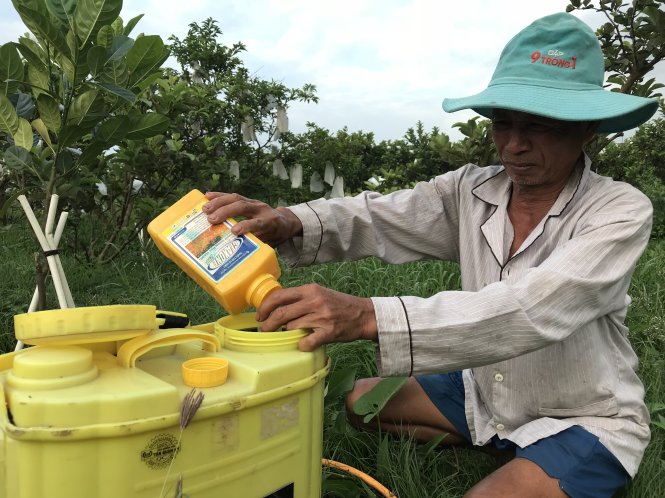Glyphosate, a purported carcinogen that was widely mentioned by international media for its involvement in the Monsanto lawsuit earlier this week, turns out to be present in all of most imported weedkillers to Vietnam.
U.S. agrochemical giant Monsanto grabbed global headliners after a court ruled that its world-popular weedkiller Roundup gave a former school groundskeeper terminal cancer.
In March 2015, the World Health Organization's International Agency for Research on Cancer (IARC) already classified glyphosate, the key ingredient in Roundup, as probably carcinogenic to humans (Group 2A).
The Plant Protection Department, under Vietnam’s Ministry of Agriculture and Rural Development, at that time, immediately allowed no more new registration of glyphosate-including products.
However, more than three years since that point, many products containing this active ingredient is still available for sales and widely used in Vietnam.
And a large number of pesticide products carrying glyphosate are also imported into Vietnam every year.
Widely used
According to Nguyen Van Hien, director of the plantation and plant protection department of the Mekong delta province of An Giang, there are currently 127 products in the list of authorized pesticides in Vietnam that have glyphosate in their contents.
In the nearby Soc Trang Province, several herbicides with glyphosate can easily be found on the shelves of many weedkiller trading establishments, said Huynh Ngoc Hap, deputy director of the provincial plantation and plant protection department.
In other provinces in the Mekong Delta region, the situation is not different.
Not only are they used in lowlands, where the fields are intensively cultivated, the practice of using pesticides have spread to villages mountainous areas.
Farmers prefer using pesticides as they can rapidly kill pests and grass. “Some even think that they cannot do farming without pesticides,” said Dr. Nguyen Tho, deputy chairman of Vietnam Plant Protection Association.
Stricter management needed
In Vietnam, the alarm of possible cancer is sounded not only for glyphosate-based products, but weedkillers in general, as local farmers tend to overuse the products.
Research results show that residues of glyphosate still remain in soil and water after the herbicides are sprayed on the plants, so they will continue to be absorbed by following crops, according to a professor teaching pesticides at Can Tho University.
"This chemical residue mainly affects the intestinal microflora, so it can affect [human health] in the long term if you eat a lot of products containing that active ingredient,” the professor said, referring to glyphosate.
According to Tho, the toxicity of ingredients in weedkillers, including glyphosate, paraquat and 2,4-D, has long been warned by scientists.
But for some unknown reason, the business of these pesticides remains rampant in Vietnam. Even when a ban on the use of these substances was issued, it would not take effect sooner than one or two years of issuance.
This relatively long window allows people to continue selling previously imported herbicides or pesticides.
“In other words, it is like encouraging producers to put all efforts to sell out these products before they are banned and to push farmers to use pesticides much more,” Tho said.
“In Vietnam, Roundup products are only used for destroying unwanted vegetation in the forest, and forbidden to be used on rice and crops,” said Le Van Da, deputy director of the plantation and plant protection department of the Mekong Delta province of Kien Giang.
“Even so, the rule turns out inadequate as it is challenging to control [the uses of weedkillers in both sectors],” Da emphasized.
 |
| A farmer in Ward 4, Soc Trang City of the namesake province in Vietnam’s Mekong Delta, sprays herbicides on his orchard. Photo: Tuoi Tre |
Moreover, there has been no warning about the toxicity of the use of glyphosate in herbicides, according to Da.
"Glyphosate is claimed safe by [chemical] producers, but the U.S. court has ruled the opposite," said Dr. Nguyen Dang Nghia, director of the Tropical Agriculture Research and Consultancy Center.
Nghia underlined that the lesson, where Monsanto was fined for failing to warn customers about cancer danger of glyphosate in its weedkillers, suggests the list of pesticides containing this active ingredient be immediately reviewed in Vietnam.
“Vietnam should soon review [pesticides containing] the active ingredient to give specific warnings to users and consider removing [it] from the list [of legal pesticides],” Nghia suggested.
Nguyen Xuan Hong, former head of the Plant Protection Department, said that Vietnam should observe the reaction of other countries before making decisions on [the fate of] glyphosate herbicides.
“But right now, it is more necessary to strengthen the management and guidelines of use [of pesticides] to minimize the potential harm [of glyphosate] on the environment and people’s health,” Hong emphasized.
Authorities still considering
In the wake of the recent verdict of Monsanto’s guilt by the U.S. court, Huynh Tan Dat, head of Division of Pesticide Management, under the Plant Protection Department, said the department still had to keep track of all official court opinions and the scientific evidence of the parties first.
The pesticide watchdog will then come to conclusion and propose to the Ministry of Agriculture and Rural Development to take measures to manage the use of pesticides with this active ingredient.
"We have reviewed the overall list of authorized pesticides, including glyphosate, in accordance with Vietnamese and international laws," said Hoang Trung, head of the ministry's Plant Protection Department.
“If pesticides are harmful to human health and the environment, they will be removed from the list [of legal pesticides],” Trung affirmed.
“However, the prohibition or permission of [certain pesticides] use must be based on the provisions of law, particularly, the law on plant protection and quarantine.
“Just because some countries forbid certain pesticides doesn’t necessarily mean Vietnam should also ban the same products,” the leader added.





















































